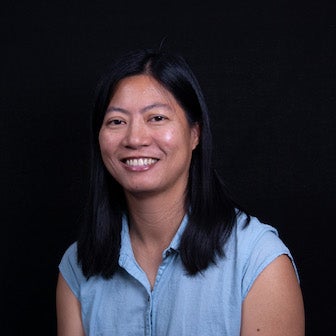Applying perturbations during a variety of locomotor tasks such as seated recumbent stepping, fixed speed treadmill walking, and self-paced treadmill walking can shift balance and gait strategies in young and older adults. Using mobile brain/body imaging using high-density electroencephalography (EEG) and multimodal neuromechanics, we can observe these changes in strategies as changes in walking speed, stepping patterns, and electrocortical dynamics. In this talk, I will discuss how young and older adults shifted stepping and walking patterns in response to locomotor perturbations and in some cases, retain these shifted patterns. Additionally, I will show that perturbations with different features such as direction, magnitude, timing, and unpredictability produce distinctive changes in walking patterns and brain dynamics.

Dr. Helen J. Huang is an associate professor in the Mechanical and Aerospace Engineering Department and Biomedical Engineering Program at the University of Central Florida (UCF). She is also a member of the Disability, Aging, and Technology (DAT) Cluster and the Bionic Materials, Implants, and Interfaces (Biionix) Cluster. She earned her MS and PhD in biomedical engineering from the University of Michigan Ann Arbor and her BS in materials science and engineering from MIT. She was also a University of Colorado Aging T32 postdoctoral fellow. At UCF, she directs the Biomechanics, Rehabilitation, and Interdisciplinary Neuroscience (BRaIN) Lab, where her team studies the brain dynamics and neuromechanics of human locomotion and locomotor adaptation. Her team also explores and develops new methods to expand electroencephalography (EEG) capabilities to study human movement and to be more inclusive. Dr. Huang’s research is funded by an NIH R01 and NSF CAREER Award.


